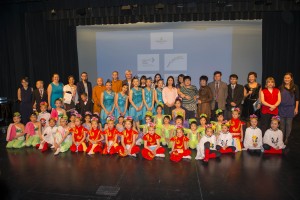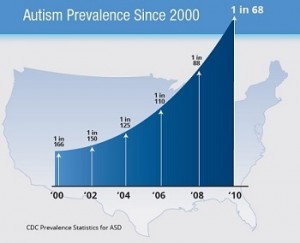Blog
Main Autism Spectrum Disorders and their Symptoms
Autism is a spectrum disorder, meaning that there is a wide degree of variation in the way it affects people, Gifted People Services wants to bring below some common concerns parents are always wondering about:
1- Where does your child fall on the autism spectrum?
The three autism spectrum disorders share many of the same symptoms, However they differ in their severity and impact:
- Classic Autism: is the most severe of the autism spectrum disorders and sometimes called autistic disorder.
- Asperger's Syndrome: it is a milder disorder and sometimes called high-functioning autism.
- Pervasive Developmental Disorder or not otherwise specified (PDD-NOS).
Note: The average majority fall in the middle range of the spectrum and only 20% of them have classic autism.
2- What are the signs and symptoms of autism spectrum disorders?
- Social Skills: such as lack of interest in other people, difficulty in making friends with children same age and unusual body language and facial expressions.
- Speech and Language: such as delay in learning or talking, doesn't understand simple words or phrases and difficulty communicating needs and desires.
- Restricted Behavior and play: such as repetitive body movements, a strong needs for routines and odd ways of moving.
3- The road to an autism diagnosis can be difficult and time consuming and this is due to high concerns about labelling or incorrectly diagnosing the child.
4- Some cases need more than one specialist to be involved in diagnosing your child autism such as:
- Child psychologists
- Child psychiatrists
- Speech pathologists
- Developmental paediatricians
- Paediatric neurologists
- Audiologists
- Physical therapists
- Special education teachers
5-The last but not the least, there is no single medical test that can diagnose it definitively, it needs multiple evaluations and tests in order to detect the child problem.
Source: http://www.helpguide.org
Ten things to know about autistic children
Autism Spectrum Disorder (ASD) has no medical detection or cure yet, however specially trained physicians and psychologists can decide autism specific behavioural evaluations.
Gifted People Services wants to share the top 10 things about Autism facts and symptoms according to “Centres for Disease Control and Prevention”
- 1 in 68 children has been identified with autism spectrum disorder (ASD).
- Children with ASD will have trouble relating to others or not have an interest in other people at all.
- Children with ASD have a tendency to repeat actions over and over again
- ASD is not subjective to race or a specific groups of people , it occurs in all racial, ethnic, and socioeconomic groups.
- Children with ASD will have trouble expressing their needs using typical words or motions commonly used by the children within their age groups.
- ASD is five times more common among boys than among girls.
- Children with ASD have trouble understanding other people’s feelings or talking about their own feelings.
- Children with ASD will not point at objects to show interest.
- Children with ASD will not look at objects when another person points at them.
If you think your child might have ASD or you think there could be a problem with the way your child plays, learns, speaks, or acts, contact your child’s doctor, and share your concerns.
Light Blue Stars Shining for Autism
 |
Last Saturday, over 250 spectators enjoyed a talent show organized by Gifted People Services in celebration of Autism Awareness Month. They gathered at the Fairview Library Theatre in Toronto where they were entertained by numerous performances presented by a variety of young artists with special needs showcasing their wonderful talents.
The purpose of the show was to increase our awareness of the effects of autism as a growing global health concern that has an immense impact on the lives of many families within our community
The show featured elaborate group dances, beautiful piano solos, and inspiring sports videos performed by children and young adults from several nonprofit organizations from Toronto. This year, young artists from Gifted People Services were joined on stage by performers from Community Living Toronto, Reach for the Rainbow, Bloomy Music Therapy, and The Chinese Culture Training Centre.
We were honored to host several important guests, such as Consul Mr. Hongruo Zhong, Councillor Chin Lee, Ms. Ying Yu, and special assistant of MPP Soo Wong, who joined audience to show their support for Autism Awareness Month. The whole show was led by our amazing MC’s: Ms. Grace Pan and Mr. Joseph Tsang.
The show could not have happened without our generous supporters - SilverCity Fairview Mall, HK Dental, Hope Centre, Charming China and McNally Piano Movers.
We hope that both the spectators and the performers had a lot of fun during our Light Blue Stars Talent Show. We’ll see you next time!
Prevalence of Autism Rises: One in 68 American children living with autism
One in 68 American children living with autism; Autism Speaks calls for immediate national action plan
Washington, D.C. (March 27, 2014) – Today, the Centers for Disease Control and Prevention (CDC) released new data on the prevalence of autism in the United States. This surveillance study identified 1 in 68 children (1 in 42 boys and 1 in 189 girls) as having autism spectrum disorder (ASD).
Autism Speaks has visited all 535 Congressional offices, organized statements from Republican and Democratic leaders in support of a national plan of action and has scheduled a 1:30pm press conference in the U.S. Capitol Visitor’s Center, Room HVC-215, with leaders from the U.S. Senate and House of Representatives to address the urgent and long-term needs of people affected by autism.
 “Behind each of these numbers is a person living with autism,” said Autism Speaks President Liz Feld. “Autism is a pressing public health crisis that must be prioritized at the national level. We need a comprehensive strategy that includes the research community, policymakers, educators, and caregivers coming together to address our community’s needs across the lifespan.”
“Behind each of these numbers is a person living with autism,” said Autism Speaks President Liz Feld. “Autism is a pressing public health crisis that must be prioritized at the national level. We need a comprehensive strategy that includes the research community, policymakers, educators, and caregivers coming together to address our community’s needs across the lifespan.”
Data also show that differences in autism prevalence continue to be seen along race, ethnicity, and socioeconomic lines, reminding us that disparities in awareness and access to care continue to be an issue. "Autism knows no racial, ethnic, or socio-economic boundaries,” Ms. Feld went on to say. “That’s why we’ve got to ensure that every family, from every community in America has access to quality, affordable health care treatment and services."
“This report also sheds light on other key issues facing the autism community today,” said Autism Speaks Chief Science Officer Robert Ring. “Though autism can be identified and diagnosed as early as age two, the average age of initial diagnosis continues to hover around four and a half years. This means that many individuals are missing out on the transformative outcomes that intensive early interventions can offer. If we’re going to make a direct and meaningful impact in the lives of these children, reducing the average age of diagnosis must be a priority moving forward.”
Autism Speaks is currently driving a federal policy agenda that would have a direct impact on the autism community. This includes reauthorizing the Combating Autism Act, which would continue to secure funding for autism research and promote accountability in how these dollars are spent; passing the Achieving a Better Life Experience (ABLE) Act, which would provide tax-free savings accounts for people with disabilities; and urging Congress to improve TRICARE and increase access and coverage of evidenced-based treatment services for military families.
Mac autism researcher gets $2.5 million grant
Ontario eliminating wait lists for developmental service
The Wynne Liberals are prepared to spend $810 million over three years to help children and adults with autism and other developmental disabilities live more meaningful lives in their communities.
Vaccines and Autism: Doctor says shots safer than trusting Jenny McCarthy
By Lindsey Riley Published: Feb 3, 2014 at 10:27 AM PST
"When they were younger, it was very frustrating," he said. "We thought we were doing something wrong. It was very stressful."
His autistic children fall on different ends of the autism spectrum.
"With Kyle, it's easier for him to overcome social interactions," Rust said. "With Sandra, it's kind of the extreme. For the longest time she would not play with someone unless it was her brother or sister. She would play next to them, but that alone was a milestone."
Small accomplishments are big victories for a family like the Rusts.
And with a diagnosis but not known cause, parents like Rust are left to wonder what caused their child to become autistic.
Vaccines have long been villified by some people in the autism community for having a possible link to the disorder.
Actress Jenny McCarthy has been very outspoken about her opinion on the issue.
"Without a doubt in my mind, I think vaccinations triggered Evan's autism," she told CNN.
McCarthy stood by this belief for years, using her celebrity to spread her message.
"Isn't it ironic that in 1983, there was 10 shots and now there's 36 and the rise of autism happened at the same time?" she told Larry King. "Parent after parent after parent says, 'I vaccinated my baby, they got a fever and then they stopped speaking.'"
Through the years, many parents have decided not to vaccinate their kids because of the perceived risk.
Some doctors say that has now put people at risk of contracting diseases that otherwise would have been supressed by the vaccines.
That's one of the reasons so many doctors and pediatricians disagree with the views McCarthy espoused.
"Vaccines work," said Dr. Pilar Bradshaw. "Vaccines are safe."
What's dangerous, she said, is taking a celebritiy's opinon as fact.
"That's just setting you and your child up for troubles because instead of going with research you're going with voodoo belief," she said.
Bradshaw said that years ago a British doctor published data connecting a vaccine to autism. That doctor later admitted his research was unfounded.
New research suggests autism may be linked to the father's genetics, but much remains uncertain.
But opinions on the issue remain as common as a certainty about the cause of autism is rare.
"I think vaccines played a role," Rebecca Middleton said on the KMTR Facebook page. "Not all cases are genetic. It was like night and day with them. One day they were typical developing babies and the next they weren't."
"To say vaccines cannot cause autism is ignorant," Shasta Haley said. "Constantly pharmaceuticals are being removed from treatment based on new found evidence of adverse affects whether slight or great risk."
The Rust family believes the autism in their family is purely genetic. They vaccinate their children.
The most important thing to Rust and his family is for other to understand that people with autism are just looking at life through a different window.
"You can look at a picture, turn it upside down," he said, "and you'll see something totally different."
Welcome to Gifted People Services blog!
Every individual is gifted. People with special needs are also gifted.
In order for families with individuals with special needs to learn more information, updated treatment, stories and news, this blog can provide a platform for parents, families, professionals, and other people who are interested in this area.
We need your support. Please visit our website for programs and services provided by us.
Dianna Jiang
Executive Director
Gifted People Services







